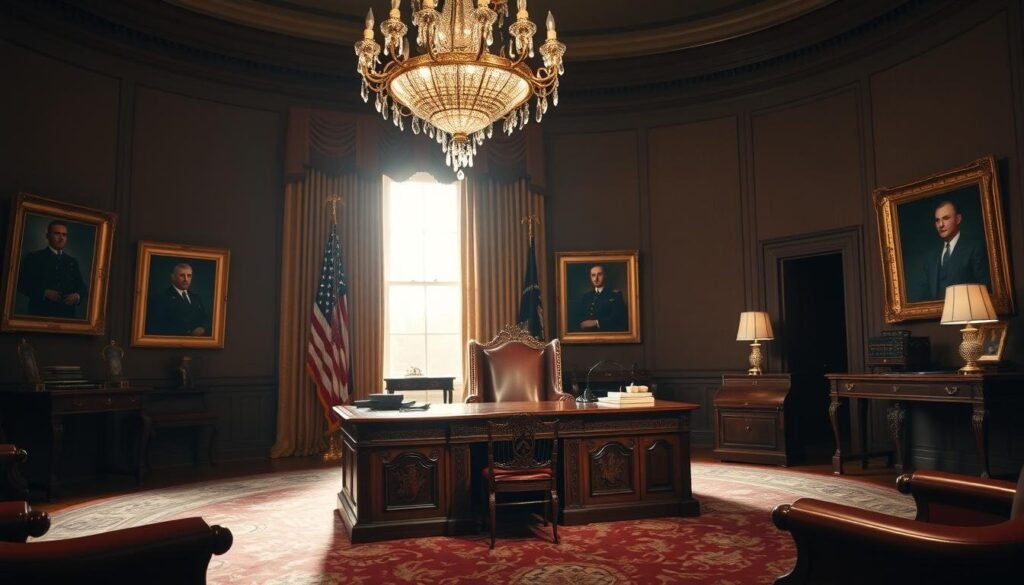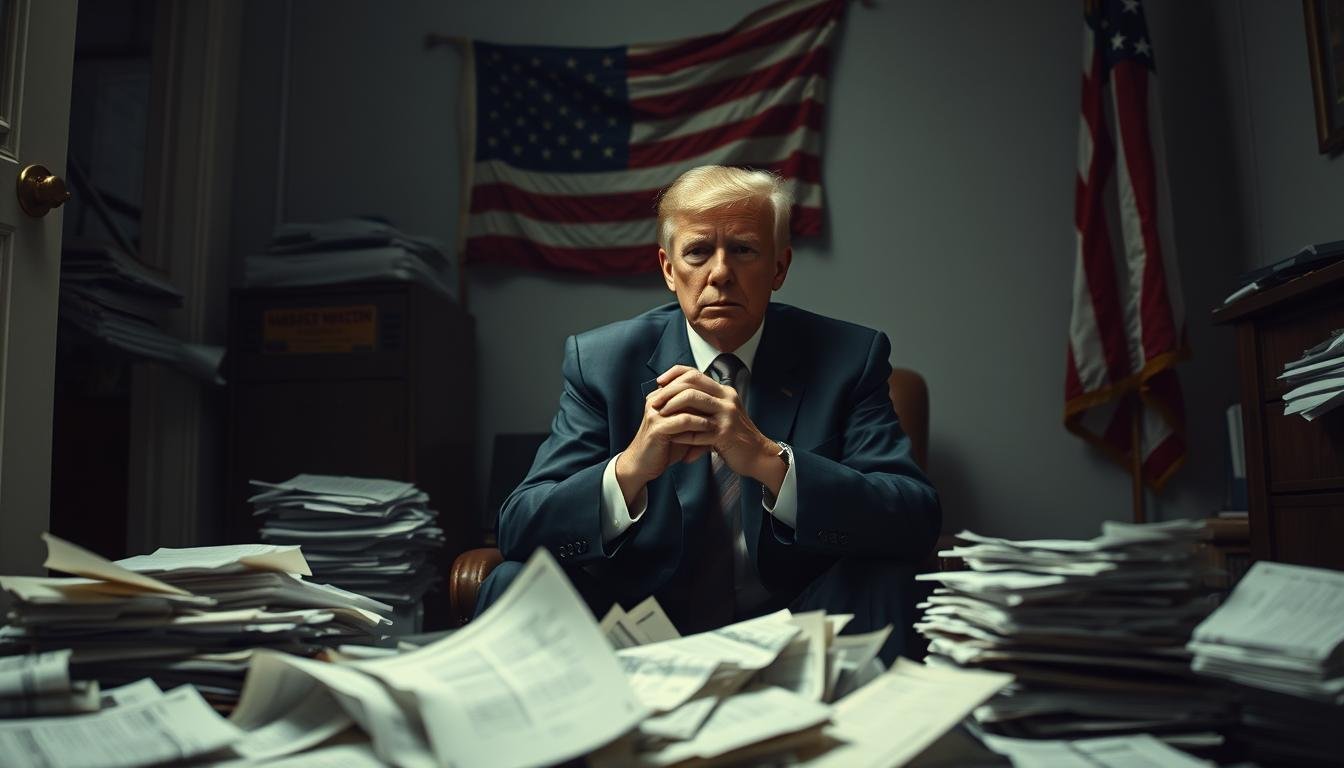Who Was the Poorest US President in History? Some US presidents faced financial struggles, even though many were wealthy. Others had to start from scratch. This shows that wealth isn’t always a given.
Learning about the poorest US president reveals how they managed their money. It also shows how wealth has changed in America over time.
Knowing about the financial battles of US presidents helps us understand their legacies. It also shows how money issues can affect a president’s work.
Contents
- 1 Presidential Wealth Throughout American History
- 2 Who Was the Poorest US President in History?
- 3 Harry Truman’s Financial Struggles
- 4 The Former Presidents Act: Truman’s Legacy
- 5 Other Presidents Who Faced Financial Hardship
- 6 From Rags to Power: How Financial Background Shapes Leadership
- 7 Conclusion: Who Was the Poorest US President in History?
- 8 FAQ
- 8.1 Who is considered the poorest US president in history?
- 8.2 What were some of Harry Truman’s financial struggles?
- 8.3 What is the Former Presidents Act, and how did it come about?
- 8.4 Were there other US presidents who faced financial hardship?
- 8.5 How have the financial backgrounds of US presidents influenced their leadership?
- 8.6 What impact did Harry Truman’s financial situation have on his post-presidency life?
- 8.7 How has presidential wealth evolved throughout American history?
Presidential Wealth Throughout American History
Did you know that US presidents have had very different financial situations? Some were quite wealthy, while others were not. This shows how the economy has changed over time in America.
Early presidents like George Washington and Thomas Jefferson were quite wealthy. They had lots of land and investments. But, not all early presidents were rich. Some even struggled with debt and money problems.
The industrialization of America brought new chances for wealth. Presidents like Ulysses S. Grant took advantage of these opportunities. Yet, others faced money troubles, even with their presidential pensions.
How much money a president had often depended on their inheritance. For example, Theodore Roosevelt was very wealthy because of his family’s money. But, others started with less.
Looking at the financial lives of US presidents helps us understand America’s economic history. It shows the many ways people can become president.
Who Was the Poorest US President in History?
When looking at the financial lives of US presidents, Harry Truman stands out. He faced big money problems and is often called the poorest US president. [Who Was the Poorest US President in History?]
It’s not common to talk about the money troubles of presidents. But, it shows us the hard times they went through. Some big money challenges they faced include:
- Low salaries compared to what they made before becoming president
- Big costs for keeping up the presidency
- Not much money left after they leave office
Harry Truman’s money problems were really tough. His low presidential pay and the tough economy at the time made things worse. His money troubles even made it hard to keep up the dignity of the presidency.
Some important facts about Truman’s money struggles are:
- His presidential salary was $75,000 a year, about $750,000 today.
- He had to pay for his family’s home and other big costs of being president.
- He had to use his military pension and other jobs to make ends meet.
Truman’s money troubles show how hard it is for presidents to keep their finances stable. His situation led to changes in how former presidents are helped financially, like the Former Presidents Act.
Harry Truman’s Financial Struggles
When Harry Truman left the White House, he faced a tough financial reality. Despite his big contributions to the country, he had financial challenges. This was not rare among some US presidents.
Truman’s money troubles started before he was president. He was a farmer and then a haberdasher, but his businesses failed. He had a lot of debt. His income as a senator and vice president was not enough to fix his financial problems.
After leaving office, Truman’s income dropped a lot. The Former Presidents Act of 1958 helped later, but Truman had to use his savings and pensions until then.
Financial Management and Post-Presidency Life
Truman was careful with his money, but he still had a hard time after being president. He made money from his memoirs and sold his presidential papers to get by. [Who Was the Poorest US President in History?]
| Financial Challenge | Description | Impact on Truman |
|---|---|---|
| Lack of Pension | No formal pension for former presidents before 1958 | Had to rely on personal savings and income from memoirs |
| Reduced Income | Significant decrease in income post-presidency | Forced to sell presidential papers for financial support |
| Debt from Business Failures | Previous business failures left Truman with debts | Continued financial strain throughout his life |
Truman’s money troubles show the financial hurdles some US presidents face. His experiences helped shape his views on presidential pay and benefits. This led to the Former Presidents Act.
The Former Presidents Act: Truman’s Legacy
The Former Presidents Act was created to help Harry Truman after he left office. It ensures that former presidents are financially secure, avoiding poverty. [Who Was the Poorest US President in History?]
In 1958, the act was passed. It offers a lifetime pension, covers office expenses, and provides medical care. This act was a significant step forward in supporting former presidents, addressing the financial difficulties that Truman and potentially other former presidents faced.
| Benefit | Description |
|---|---|
| Lifetime Pension | A financial stipend provided to former presidents for life. |
| Office Expenses | Funding for maintaining an office after leaving office. |
| Medical Care | Comprehensive medical care for former presidents and their spouses. |
The Former Presidents Act has made sure future presidents won’t face financial troubles like Truman did. It shows the value of supporting those who have led the country.
Other Presidents Who Faced Financial Hardship
Beyond Harry Truman, many US presidents struggled with money. This affected their lives and how they led the country. It’s interesting to see how financial troubles touched some of America’s leaders.
Abraham Lincoln grew up poor and didn’t have much education. Yet, he became a successful lawyer and the 16th President. Even as president, Lincoln faced money problems from the Civil War.
Theodore Roosevelt came from a rich family but still had money troubles. His charity work and keeping up appearances cost a lot. These money issues shaped his presidency.
Other presidents also dealt with financial struggles:
- Thomas Jefferson was always in debt.
- James Madison, the “Father of the Constitution,” had money problems because of his low pay.
- Warren G. Harding faced scandals and spent a lot, leading to financial issues.
These stories show that money troubles were common among US presidents. Their financial struggles often influenced their decisions and views as leaders.
From Rags to Power: How Financial Background Shapes Leadership
The financial backgrounds of US presidents have shaped their leadership in many ways. Each president’s financial history has influenced their approach to challenges and decision-making. For example, Harry Truman, who faced financial struggles, was more understanding of the common person’s economic woes.

Conversely, wealthy presidents like the Kennedys used their financial knowledge to guide economic policies. The financial experiences of US presidents, whether of wealth or hardship, have significantly influenced their leadership approaches. This shows how important a president’s financial background is in their leadership style.
Conclusion: Who Was the Poorest US President in History?
You’ve learned about the poorest US president, Harry Truman, and his money troubles. You also know about the Former Presidents Act’s role. These financial issues affect a president’s legacy and choices.
Truman’s money problems show how a president’s wealth can influence their leadership. Other presidents have also dealt with financial issues. This shows the varied financial backgrounds of US leaders.
Knowing about a president’s money troubles helps us understand their leadership. A president’s financial situation is just one part of their legacy. It greatly influences their presidency and impact on the nation.
See Also: Lincoln’s Assassination and Its Impact on Reconstruction
FAQ
Who is considered the poorest US president in history?
Harry Truman is often seen as one of the poorest US presidents. This is because he struggled a lot with money both during and after his presidency. [Who Was the Poorest US President in History?]
What were some of Harry Truman’s financial struggles?
Harry Truman had big money problems. His income dropped a lot after he left the White House. He had to sell his belongings and live off his military pension.
What is the Former Presidents Act, and how did it come about?
The Former Presidents Act is a law that helps former US presidents financially. It was made because of Harry Truman’s money troubles. It makes sure future presidents won’t face the same money problems.
Were there other US presidents who faced financial hardship?
Yes, many US presidents had money troubles. Thomas Jefferson had debt issues. James Madison had to sell his stuff to get by after leaving office. [Who Was the Poorest US President in History?]
How have the financial backgrounds of US presidents influenced their leadership?
A president’s money background really shapes their leadership. Those who grew up poor often see things differently than the wealthy. This can change how they make decisions.
What impact did Harry Truman’s financial situation have on his post-presidency life?
Harry Truman’s money troubles really affected his life after being president. He had to make tough choices and rely on his pension. But he still got to live in the White House for a bit.
How has presidential wealth evolved throughout American history?
The wealth of presidents has changed a lot over time. This is due to things like industrialization, inheritance, and the US economy’s shifts. It’s led to a wide range of financial backgrounds among presidents.

Hi, I am Tatum Bradford from Washington. I have a background in political science and work as a senior revenue officer. I love learning about U.S. presidents and sharing interesting facts about political history.

